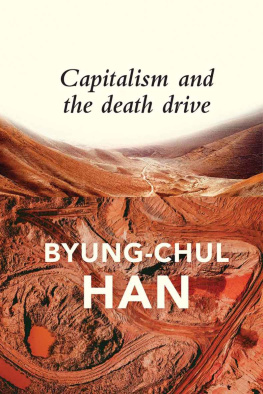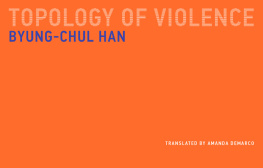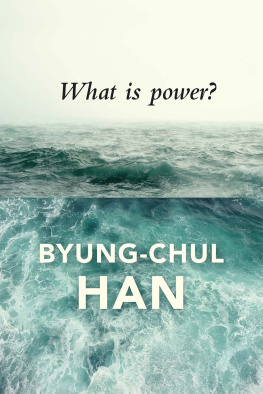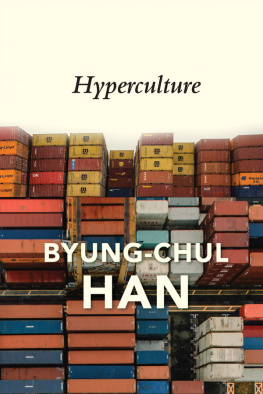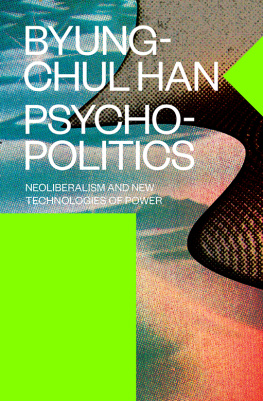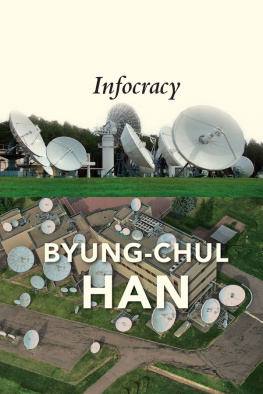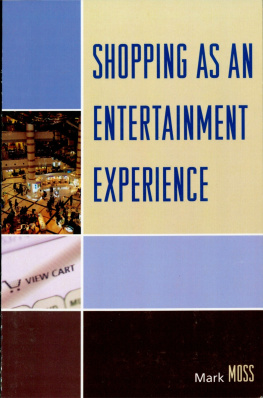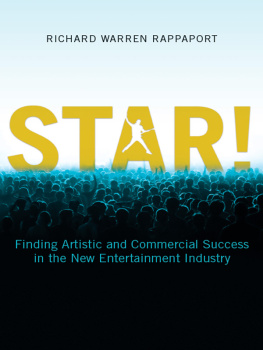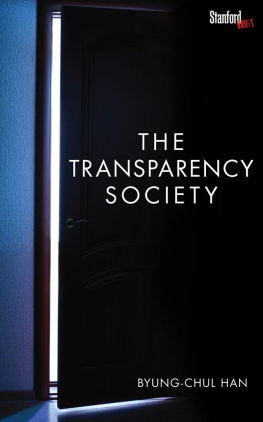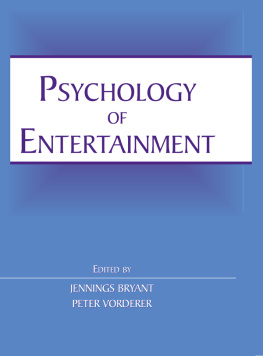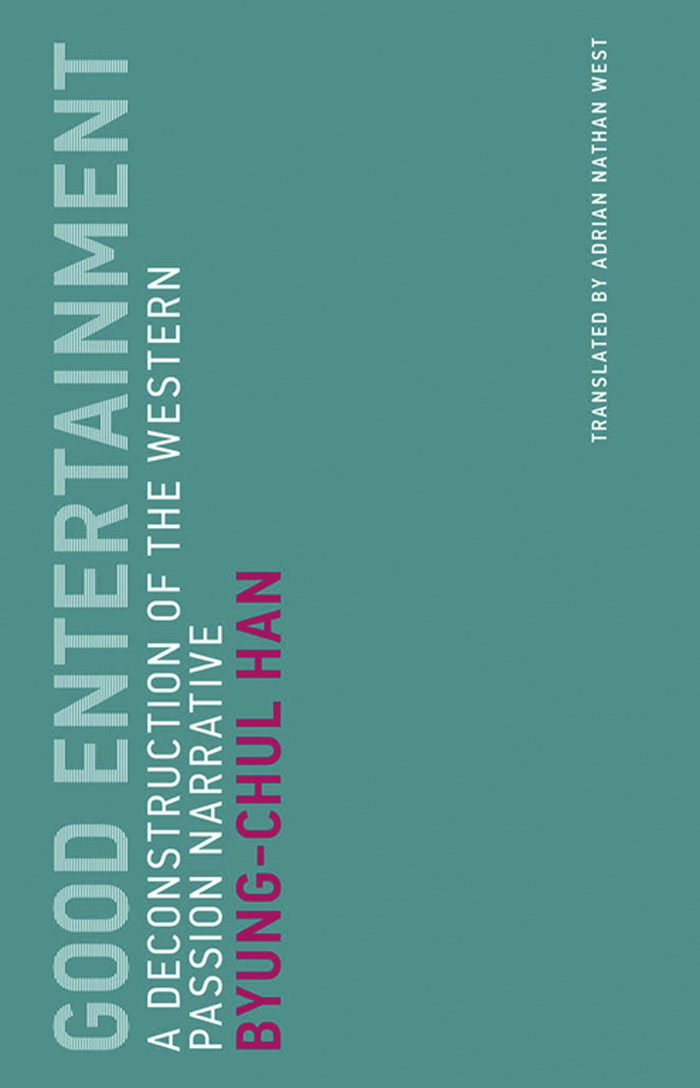
Good Entertainment
Untimely Meditations
1.The Agony of Eros
Byung-Chul Han
2.On HitlersMein Kampf: The Poetics of National Socialism
Albrecht Koschorke
3.In the Swarm: Digital Prospects
Byung-Chul Han
4.The Terror of Evidence
Marcus Steinweg
5.All and Nothing: A Digital Apocalypse
Martin Burckhardt and Dirk Hfer
6.Positive Nihilism: My Confrontation with Heidegger
Hartmut Lange
7.Inconsistencies
Marcus Steinweg
8.Shanzhai: Deconstruction in Chinese
Byung-Chul Han
9.Topology of Violence
Byung-Chul Han
10.The Radical Fool of Capitalism: On Jeremy Bentham, the Panopticon, and the Auto-Icon
Christian Welzbacher
11.German Philosophy: A Dialogue
Alain Badiou and Jean-Luc Nancy
12.Portrait of the Manager as a Young Author: On Storytelling, Business, and Literature
Philipp Schnthaler
13.Waste: A New Media Primer
Roberto Simanowski
14.The Death Algorithm and Other Digital Dilemmas
Roberto Simanowski
15.Law As Refuge of Anarchy: Societies without Hegemony or State
Hermann Amborn
16.Enlivenment: Toward a Poetics for the Anthropocene
Andreas Weber
17.Against Nature
Lorraine Daston
18.Good Entertainment: A Deconstruction of the Western Passion Narrative
Byung-Chul Han
Good Entertainment
A Deconstruction of the Western Passion Narrative
Byung-Chul Han
translated by Adrian Nathan West
The MIT Press
Cambridge, Massachusetts
London, England
This translation 2019 Massachusetts Institute of Technology
Originally published as Gute Unterhaltung. Eine Dekonstruktion der abendlndischen Passionsgeschichte in the series Frhliche Wissenschaft by Matthes & Seitz Berlin: Matthes & Seitz Berlin Verlagsgesellschaft mbH, Berlin 2016. All rights reserved.
All rights reserved. No part of this book may be reproduced in any form by any electronic or mechanical means (including photocopying, recording, or information storage and retrieval) without permission in writing from the publisher.
This book was set in PF DinText Pro by Toppan Best-set Premedia Limited. Printed and bound in the United States of America.
Library of Congress Cataloging-in-Publication Data
Names: Han, Byung-Chul, author.
Title: Good entertainment : a deconstruction of the western passion narrative / Byung-Chul Han ; translated by Adrian Nathan West.
Other titles: Gute Unterhaltung. English
Description: Cambridge, MA : MIT Press, 2019. | Includes bibliographical references.
Identifiers: LCCN 2018059326 | ISBN 9780262537506 (pbk. : alk. paper)
Subjects: LCSH: Aesthetics, Modern. | Deconstruction. | ArtsMoral and ethical aspects. | Jesus ChristPassion. | AmusementPhilosophy.
Classification: LCC BH151 .H2813 2019 | DDC 111/.85dc23 LC record available at https://lccn.loc.gov/2018059326
10 9 8 7 6 5 4 3 2 1
d_r0
Contents
Preface to the New Edition
The history of the West is a passion narrative. Achievement is the new formula for passion. Passion makes its reappearance as a killjoy. In truth, work and play are mutually exclusive. But today, even play is being subordinated to production. It is being gamified.
The achievement society remains a society of passion. Even athletes dope themselves to achieve better performance. Something grotesque inheres in the entertainment that arises as an incidental corollary. It deteriorates into mental deactiviation. A definitive triumph over the age of passion will bring not only good entertainment, but also beautiful entertainment, that is, entertainment through beauty. PLAY will exist again.
Preface
Its character is passion. Music does not suffer in man, it does not partake of his dealings and his feelings: it suffers over him ... Music lays ... gently on his shoulders the suffering mandated by the stars above.
Theodor W. Adorno
Writing as a form of prayer.
Franz Kafka
Something fundamentally new is arising at present through the ubiquity of entertainment. A basic change is occurring in our understanding of the world and reality. Entertainment today is vaunted as a new paradigm, even a new credo for being, which decides what is and is not apt for the world, indeed, what is, period. In this way, reality appears as a characteristic effect of entertainment.
The totalization of entertainment leads to a hedonistic world that the spirit of passion interprets as, disparages as, abasement, invalidation, nonbeing. And yet, in their essence, passion and entertainment are not entirely different. The pure meaninglessness of entertainment is adjacent to the pure meaning of passion. The fools smile bears a ghastly resemblance to the pain-racked visage of Homo doloris. The latter mortgages happiness for bliss. This paradox demands further exploration.
Sweet Cross
By thee, source of all good things,
Much good has befallen me.
Thy mouth has refreshed me
With milk and sweetmeats.
Thy spirit has favored me
With many a heavenly longing.
Johann Sebastian Bach, Saint Matthews Passion
When Saint Matthews Passion was first played in the Saint Thomas Church in Leipzig on Good Friday in 1727, all present were driven, according to reports from the time, into a state of utmost astonishment. Councilors and noble ladies looked at each other and said: What will come next? From horror, a pious widow shouted: God help us, children! It is like being at an opera or a comedy! This, according to a certain Christian Gerber in his History of Church Ceremonies in Saxony.
The effect of Saint Matthews Passion on the Leipzig notables must have been excessively theatrical and operatic. Its recital sharpened already existing tensions with Bach. The council resolved to cut his wages. In the contract Bach signed as Thomaskantor, it reads: For the maintenance of good order, to provide music in the church that shall not last too long, and to perform it in such a way that its effects are not operatic, and it encourages silent devotion in the listener.
On one hand, Latinate airiness, sensual raptness, and lush, luxuriant melody play an increasingly decisive role in the musical life of Bachs era. Connoisseurs and enthusiasts make up the new music-consuming public. For them, appreciation consists primarily of enjoyment and the cultivation of taste. On the other hand, even in Lutheran Orthodox circles, critical voices rise up against the presence of art
Gerber would prefer that organs be banned from the church: Nor is one organ sufficient, in many churches there must be two, and we are driven to ask: wherefore all this excess?
Church music is a mere ornament. It is external to the essence of worship. Gerber invokes Theophil Grogebauer, whose basic hostility to music brings him close to the Pietists, citing his Voice of a Guardian from Devastated Zion (1661), a text rife with prophetic fervor: The playing of music rather amuses the sentiments than inclines the heart inwardly toward things divine.
The strict division between internal and external, heart and sentiment, essence and ornament, meal and seasoning, is problematic. Does seasoning not belong somehow to the essence of a meal? Might there not be a divine word that, instead of bitter medicine, is


